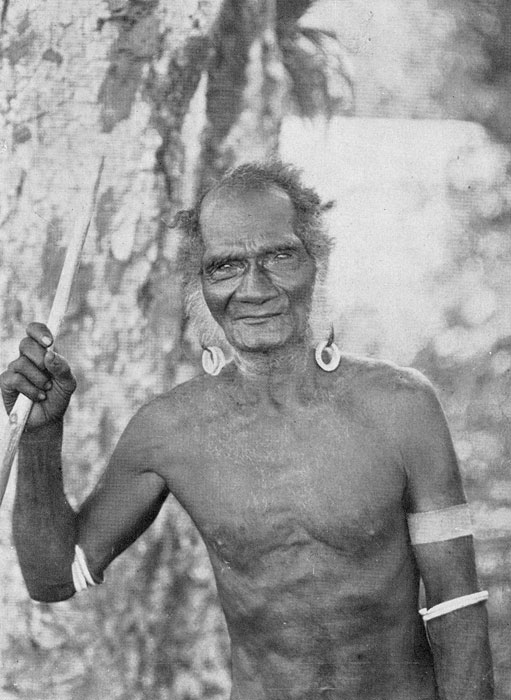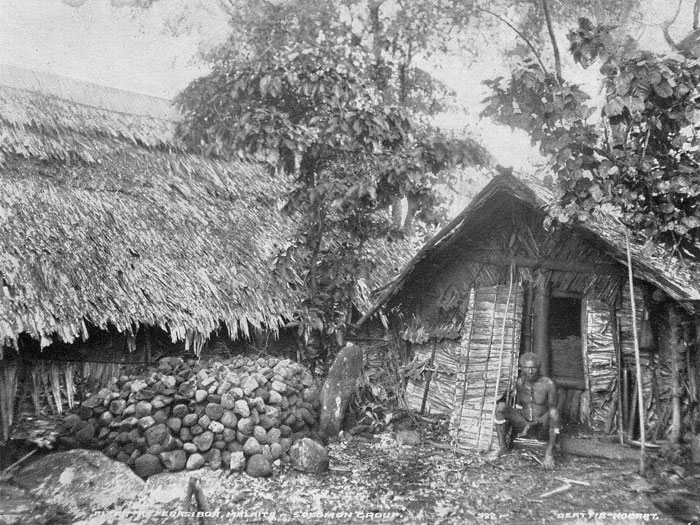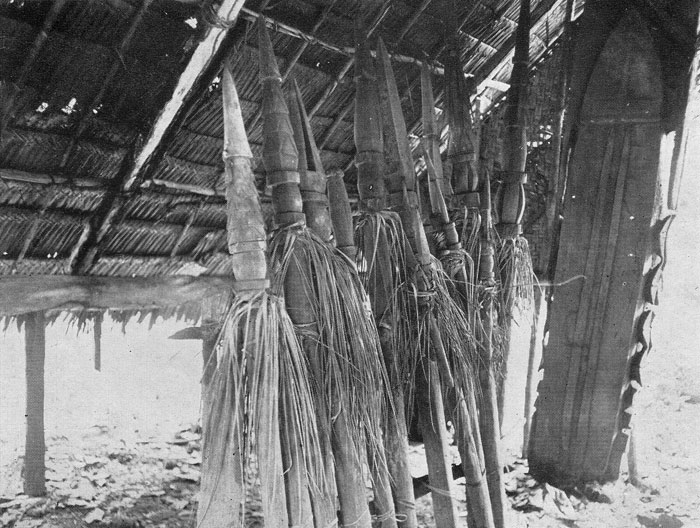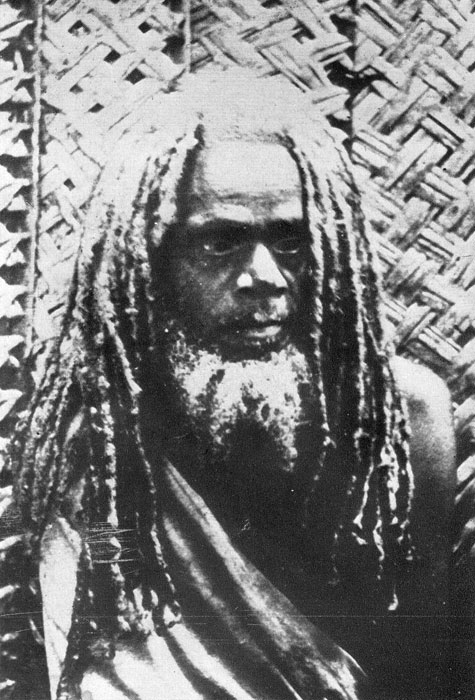NOTICE the combination of religion and customs. We have many customs which are non-religious, but it is not so with the Melanesian. All he thinks and says, and does, has close reference to, deference to, allegiance to, and fear of, a spiritual world close about him. He is in religion what is called an animist--a man who thinks of objects in terms of soul, not a materialist; perhaps if the word were not already appropriated we should call him a spiritualist. To the animist there is soul in everything, some sort of mysterious life or power, in tree and wood, in stone, in bird, fish, food, tiniest scrap of anything or huge block. The "mana," spiritual power, either friendly or hostile, strong or weak, may be made available for help if properly used, or if hostile made helpless, by availing oneself of superior "mana". So he prays, sacrifices, uses innumerable charms, enslaves himself to witchcraft and superstition. His world is peopled with ghosts, before whom he trembles; but some of them are friendly, and so he hopes for help against the hosts of ghostly enemies. It is a religion that, in its practical working, makes him a vengeful cannibal, for his eating of human flesh was to absorb the "mana" of the eaten man, and also that of his tribe, for individual and tribe could not be separated. It has a tender side, too, for see the same cannibal animist offering sacrifice to the spirit of his dead little child that he may do what he can from the spirit world to help his father. Morally animism is thick with unreasoning superstitions, and very vengeful. [3/4] Death is the great disaster, and like every other disaster is caused by a hostile spirit, set in operation by an enemy, who must be sought out, and his power destroyed, by means of witchcraft. Recovery from sickness, or any sort of thing that is good, e.g., a good day's fishing, is due to friendly spirits, to whom thanks and sacrifice are due. So the Melanesian goes nowhere, does nothing, plans nothing, without prayer and sacrifice. All his customs, then, are religious and bound up with his religion, for they are one. His religion is the worship of disincarnate spirits; and those spirits are ever round about him.
Let us look at a few of the main words of his religious vocabulary, using the "Mota" language, and try to get a glimpse through them of his religious life.
"Mana."--power or influence, not physical but showing itself in enabling a man to do or to get what he wants. This "mana" may be in anything, men, wood, trees, animals, stone, or any object large or small, and can be invoked by charms for use. Living beings, spirits or men, liberate it and set it free for use through prayer and sacrifice or charms. Certain things have "mana" for particular purposes; a stone for instance, will have "mana" for making yams grow big; a charm, a form of words, has "mana", e.g. to bring rain. Some spirit has associated itself with the stone or bit of bone, or whatever it is, and works through it. So men have "mana" because of some spirit whose power they can use.
"Prayer" (Tataro).--This is more invocation than prayer. The Melanesian invokes the spirits in every kind of necessity. It may be an informal call to his father's spirit, or it may be a formal invocation with a [4/5] proper form of words. There is no seeking for holiness in these prayers; they are often ended with curses invoked on enemies; they are to get something desirable, or to avert something feared. A Melanesian prays thus for rescue from danger, success in gardening, planting, or fishing, or pig-breeding, courage in fighting; and for his enemies' failure. His prayers are not for wisdom, or goodness, or any advance morally or spiritually. But they are very real and earnest and link him closely to the spiritual world.
Sacrifice (Oloolo).--Sacrifices are constantly being offered in many ways and in many places. They may be offered anywhere, at any time, on land or sea, but there are also definite places of sacrifice. There are tales told of human sacrifices, but this, even in old days, must have been rare. The usual sacrifices are pigs, fish, vegetable foods, nuts, kava, mats, leaves, almost anything may be offered in large or small quantities. By them the spirits of the dead are remembered and pleased and made wiling to help, or appeased if any or neglected, or thanked for help given. The offerings are made often not to the spirit directly, but to the man who is connected with the spirit and can approach it.
Images (Totogale).--Melanesians are not idolaters, image worshippers. When they lay offerings at the foot of a carved image, they do not worship the image, nor is the image itself holy, but it is by way of remembrance or memorial. The spirit invoked is not in the image, but the image represents the spirits, some dead chief perhaps who has become a powerful spirit; the offering laid before such an image is not to the image, but to the spirit whom the image recalls or represents. These images are given up by Christians as a sign that they no longer worship the spirit concerned, which is independent of the image.
[6] Sacred Places, Shrines.--These are very numerous. There are places, perhaps an isolated islet, where no heathen dares to land, for it is an abode of spirits, and a place of awe. The spirit of the dead goes to "Hades". "Hades" is some spot distant from the dead man's home to which the spirits go. Different islands localize their "Hades" differently. There are sacred places in or near the village where they sacrifice to, and worship, the spirit of the place; there is the skull house, which only the witch-doctor may enter, as its guardian; there are stone altars outside the chief's house, or on the beach, or in a bush clearing connected with the tribal spirits. Sacred places are fenced off and sacrifices offered there to the spirit, and in it may be a shrine. Such places are treated with great respect, and can only be approached or led into by a priest, or one who knows the spirit, and the right approach by sacrifice and incantation.
The Head.--To the head is attributed a natural sacredness. No young man can take anything from above an elder's head. After death great power is attributed to the skull of the dead man. The heads of enemies killed in fight were preserved as trophies, and a powerful chief would make large collections of the skulls of those killed by or for him. The heads of the deceased were kept by their own people in skull houses, and preserved as memorials, worthy of worship. The loss of such skulls is much felt. To recover a skull from a hostile tribe who have possessed themselves of it, is worth years of planning and effort. Head-hunting as a regular practice was not a custom east of Bugotu, but throughout the Solomons the heads of enemies killed in battle were kept as trophies.
Cannibalism.--This never was universal but peculiar to certain districts. Nor was it practiced for the sake of eating flesh, but as a mark of extremest vengeance, and to absorb the "mana" not only of the eaten one, but of the tribe. It is a religious practice done ceremonially.




[7] Magic and Magicians.--There are a great host of wizards, witch-doctors, diviners, who work by magic; who make rain, or sunshine, cause or cure disease, bring luck or disaster, by magical arts. They know how, by enchantments, spells and sacrifices, to set free the "mana" required. Generally one practices one branch of the profession. One specialized in rain-making, another in healing. The magicians have pupils whom they train to succeed them in one or many branches of the profession. There are "high-priests" in some islands, to whom a whole district turns for magic beyond the compass of the local practitioner. They have no special influences apart from the practice, but live the ordinary tribal life. Dr. Codrington classifies their practices under heads of sickness, weather, witchcraft, dreams, prophecy and divination, ordeals, poison, curses. He writes: "In all these whatever is done is believed to be effected by the 'mana' of spirits and ghosts, acting through various media, and brought to bear by secret forms of words to which the power to work is given by the names of the spirits or ghosts, or of the living or lifeless things to which this mysterious influence is attached." When the hoped-for result follows, the wizard gets credit and money; if it fails it is because a still stronger spirit with stronger "mana" has opposed, and then the wizard loses no credit.
Private individuals sometimes practice black-magic to destroy an enemy. They use poison, or rather attribute poisonous power to charmed objects, or practice secretly by enchantment in their huts. They kill by suggestion. This black-magic is feared and detested, and its practitioners, real or suspected, are liable to be killed. Even their own tribe avoid them, and do not actively resist or resent their being killed by those of another tribe paid to do so.
[8] "Tapu."--This is forbidding certain actions under penalty of a curse, or putting things under the protection of some spirit, who will avenge any breach of the "tapu". A "tapu" is respected in proportion as it is believed that the "tapu" maker has some sprit behind him. When this is doubted or braved the unbeliever or bravo breaks the "tapu" and risks the consequences. But for the majority it seems better to keep on the safe side. So trees, or huts, or gardens, or bunches of fruit are "tapu'ed", so as to protect them for their owner. In fits of vexation Melanesians will impose "tapu's" upon themselves for life, swearing by something holy never to eat such and such a food, or enter a "tapu'ed" house or canoe, or lift a hand to help a "tapu'ed" parent or friend. A man, for example, seeking vengeance will "tapu" a favourite food till he has attained his object, and may die with the "tapu" still in force. Such "tapu's" are very binding. A little child will put a "tapu" mark on something he wants or claims for himself, and it will be respected, for there may be at any rate some little "mana" behind it. A big chief's "tapu" is formidable, not because of himself, but because he is likely to have a powerful spirit behind him.
Chiefs.--These are found in every village, but in different islands their position and power vary much. They are often chiefs by inheritance, strictly through the mother, but in many places son or brother succeeds on the death of a chief. The tribe sometimes choose their headman. Occasionally a man famous as a fighting man, or for cunning, who has acquired money, will become a chief. Behind the chief and cause of his authority is the belief that he has control of the "mana" of some powerful spirit or spirits. By ability and character he may obtain very considerable influence in a district and act as master of numerous allied tribes who obey his will. He [8/9] has young men retainers who fight for him and work for him, execute his threats, and share his money and prestige. A chief has power to fine, or order the death of, the contumacious, if his "mana" is great enough. As his personality is strong or weak, so he leads the tribe, or merely expressed their will, or when that is doubtful sits on the fence. When unable to impose his will he sulks, in hope that fear of his "mana" will bring opposition to an end in time. If successfully defied he loses "mana"--the spirits are not with him, and he need not be feared.
Elders.--Considerable respect for the older men was the rule in heathen Melanesia and is not wholly lost yet. They formed a sort of informal village council and with the chief controlled its affairs. The respect for them was at bottom religious, for they were the men who knew most about the spirits and how to use them, and so had "mana"; they held, too, the purse-strings and could pay for magic, sacrifices and so forth; and it was best to treat them with respect, go on their errands, and in tribal matters obey them. The young man's turn would come soon, when he accepted marriage and settled down. As a married man with a hut of his own he soon acquired status and position in his tribe.
Marriage.--Marriage is always into another tribe, never within the native tribe, and descent is though the mother, not the father (but in the S.E. Solomons descent in practice follows the father). So a man's children are not his kindred, but his sister's children are. They adoption of children is very common. These will often be of the wife's kin, and treated as though her own. A marriage is made valid by payment which varies in amount, made in pigs, porpoise teeth, and shell money. Infant betrothal, with a small sum to bind it, was very common. Divorce was made regular by repayment of money. If this was refused there would be trouble. [9/10] Adultery rendered the man liable to be killed, though he might save himself by heavy payment of compensation if the aggrieved party accepted it; for the woman it meant, if not death, degradation to an immoral life. Polygamy was quite regular, but common only in the case of chiefs or older men who could afford it. The chief feature of the varying marriage ceremonies was the public handing over of the monies, with many speeches from the donors and others. This payment was raised often by the tribe who bought a wife for one of their young men. He might not ever know who was being bought; it was one of the girls of a particular tribe. Tribes remembered these transactions, and if tribe A had bought a wife from tribe B for 3 pigs, 10 strings of money, and 1,000 porpoise teeth, it was due to tribe B eventually to buy a wife from tribe A for the same amount. This was why an independent choice was disapproved, and gave so much trouble. However, often a young man would run away into the bush with the girl of his choice, and leave it to his relations to settle the matter. On his return a very complicated adjustment of accounts between the people of the girl run away with and the people of the girl whom he was to have married and the boy's people followed, and would be a long and noisy affair. The majority of married couples settled down to a life union, but there was always the minority causing trouble and scandal, and these were a fruitful cause of fightings and quarrels in which all took part.
Death and Burial.--After the separation of soul and body in death, the great man's soul becomes a great ghost, to be much feared and venerated, its help sought and its displeasure feared. This may last, in the case of a powerful chief, for a generation or a few generations, but the memory gradually dies out, as new claimants for honour die and are held in honour. A little man's ghost will be of concern only to his nearest relations, except for [10/11] a few days. For every death is upsetting to the whole village at the time.
Death by accident, or violence, or above all by suicide is very terrifying. The ghost will be restless, uneasy, vengeful, and need much appeasing. A jealous wife or husband will sometimes commit suicide that the ghost or spirit may be free to take vengeance for the wrong he or she was too feeble, or unable, to exact on earth. As to the disposal of the body, there are many various methods and ceremonies. Earth burial in a shallow grave in the garden or near the hut of the dead is common. Later on the skull is dug up and placed in the hut, or skull house. Throwing into the sea is the custom in some places. In others the body is placed on a rock out at sea, or in a tree, or hung up in the hut, in a coffin, over the fire. The head or other relic, such as teeth or finger-bone, is eventually taken and stored in a shrine for veneration. If the dead man is held in honour, his fruit trees, coconut trees, and others will be cut down. In the case of a chief, if his own village do not do this, hostile villages will raid the trees or gardens. If so, the village loses prestige, and the balance of power is changed between the villages. A succession of funeral feasts is made, till the tale of pigs promised is completed at a big final feast months after the death. After a death there is much dread of his ghost appearing, and consequently reports of its being seen are numerous. This portends death to be the seer, who may die of fear if convinced that his time has come. The abode of the ghost is some distant islet above-ground, or some dim Hades underworld, but, for a short time after death, the ghost is close at hand. The women weep and wail, and these demonstrations are renewed on the arrival, perhaps years later, of some absent near relative. In the case of an important death the burial is deferred till those expected from some distance have arrived; in other cases the body is quickly disposed of.
This is a very compressed and generalizing summary of native religion and customs. Space does not allow of more. Full and detailed accounts must be got from books such as Dr. Codrington, Dr. Fox, Dr. Ivens have written, which reveal what patient and accurate research has discovered on these matters.
1. What is the meaning of the word "animist"?
2. What is the meaning of the word "mana"?
3. Is the Melanesian an idolater?
4. How and where does the Melanesian sacrifice?
5. Show the veneration of the Melanesian for the head.
6. Show the great influence of magic in the lives of the people.
7. What is "tapu"?
8. To what extent is the chief powerful?
9. What makes a valid marriage in Melanesia?
10. How do they deal with their dead?
11. Why are they so full of fear of ghosts?
12. What is the inevitable result of such a religion?
The Melanesians -- Their Anthropology and Folk-lore,
R. H. Codrington.
The History of Melanesian Society, W. H. R. Rivers.
On the Threshold of the Pacific, C. E. Fox.
Melanesians of the S.E. Solomon Islands, W. G. Ivens.